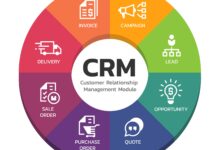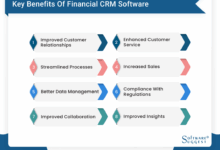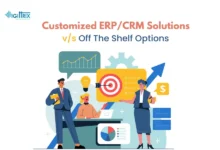Affordable CRM Software For Startups: Essential Features And Best Practices
At the forefront of business success lies Affordable CRM Software for Startups, offering a comprehensive guide to navigating the complex world of customer relationship management with cost-effective solutions. Dive into this informative piece to uncover key insights and strategies tailored for startup ventures.
Importance of CRM for startups
CRM software plays a crucial role in helping startups effectively manage customer relationships, leading to improved customer satisfaction and retention.
Specific Features of CRM Systems for Startups
- Centralized Customer Data: CRM systems allow startups to store all customer information in one place, making it easier to access and analyze customer data.
- Automated Task Management: CRM tools help startups streamline sales processes by automating tasks such as follow-ups, lead nurturing, and email campaigns.
- Sales Pipeline Tracking: Startups can track their sales pipeline more effectively with CRM software, identifying opportunities for growth and areas for improvement.
- Customizable Reports: CRM systems enable startups to generate customizable reports on key metrics, helping them make data-driven decisions to drive business growth.
Examples of Successful Startups Using CRM Tools
Companies like Airbnb, Uber, and Slack have leveraged CRM tools to scale their operations, improve customer engagement, and drive revenue growth. By utilizing CRM software, these startups have been able to personalize customer interactions, track sales performance, and optimize marketing campaigns, ultimately leading to their success in the competitive market.
Key features to look for in affordable CRM software
When selecting CRM software for your startup, it is essential to prioritize features that align with your business needs and goals. Here are some key features to consider:
Contact Management
Effective contact management is crucial for startups to keep track of customer interactions and information. Look for CRM software that allows you to easily organize and access contact details, communication history, and preferences.
Lead Tracking
Tracking leads through the sales funnel is essential for startups to identify potential customers and nurture relationships. Choose a CRM solution that offers lead tracking functionalities, such as lead scoring, automated lead assignment, and lead status updates.
Reporting
Reporting capabilities are essential for startups to measure performance, track key metrics, and make data-driven decisions. Ensure that the CRM software provides customizable reporting features, such as sales forecasts, pipeline analysis, and performance dashboards.
Customization Options
Customization options allow startups to tailor the CRM software to their specific needs and workflows. Look for software that offers customizable fields, layouts, and automation rules to adapt to your business processes.
Scalability
Scalability is crucial for startups as they grow and expand their operations. Choose a CRM solution that can scale with your business, accommodating increased data volume, user numbers, and integrations as your company evolves.
Cost-effective CRM solutions for startups
When it comes to choosing a CRM solution for your startup, affordability is key. Here, we will explore some budget-friendly CRM software options tailored for startups, compare pricing plans, and discuss the importance of long-term costs and scalability.
Budget-friendly CRM software examples
Below are some examples of CRM software that offer cost-effective solutions for startups:
- HubSpot CRM: HubSpot offers a free version of their CRM software with basic features, making it a great option for startups on a budget.
- Zoho CRM: Zoho CRM provides a range of pricing plans, including a free version for up to 3 users, ideal for small startups.
- Freshworks CRM: Freshworks CRM offers affordable plans with a focus on ease of use and scalability, perfect for growing startups.
Comparing pricing plans
It is essential to compare pricing plans of different CRM providers to find the best fit for your startup. Consider factors such as the number of users, features included, and scalability options when evaluating costs.
| CRM Software | Pricing | Key Features |
|---|---|---|
| HubSpot CRM | Free plan available, paid plans starting at $45/month | Integration capabilities, customer support |
| Zoho CRM | Free plan for up to 3 users, paid plans starting at $12/month/user | Customization options, integration capabilities |
| Freshworks CRM | Affordable plans starting at $29/month/user | Scalability, ease of setup |
Implementation process and tips for startups
When implementing a CRM system for your startup, it is crucial to consider the ease of setup and training requirements. Look for software that offers user-friendly interfaces and comprehensive training resources to ensure a smooth transition.
Here are some tips to help startups maximize the efficiency of their chosen CRM system:
- Regularly update customer data to maintain accurate records.
- Utilize automation features to streamline processes and save time.
- Provide ongoing training to employees to ensure they are utilizing the CRM system effectively.
Key Factors to Consider when Choosing Affordable CRM Software for Startups
When selecting affordable CRM software for your startup, there are several key factors to consider to ensure you are making the right choice. From customization options to scalability and integration capabilities, these factors can help you streamline your business processes and drive growth efficiently.
Customization Options
- Look for CRM software that offers customization options to tailor the platform to your specific business needs.
- Custom fields, workflows, and reports can help you optimize your CRM system to match your unique processes and requirements.
- Ensure the software allows you to personalize user interfaces and dashboards for a more user-friendly experience.
Scalability and Flexibility
- Choose a CRM solution that can scale with your business as it grows, accommodating more users, data, and functionalities.
- Flexibility in terms of adding modules or features as needed can ensure your CRM system evolves alongside your startup.
- Consider cloud-based CRM software for easy scalability and accessibility from anywhere, anytime.
Integration Capabilities
- Ensure the CRM software integrates seamlessly with other tools and platforms your startup uses, such as email marketing software, accounting systems, or e-commerce platforms.
- Integration capabilities can streamline data flow, eliminate silos, and provide a unified view of customer interactions across different channels.
- Look for pre-built integrations or APIs that allow for easy connections with third-party applications.
User-friendly interface and ease of adoption
Intuitive interfaces play a crucial role in CRM software for startups with limited resources. A user-friendly design helps streamline processes, reduce the learning curve, and increase overall productivity.
The Role of Training and Support Options
Providing adequate training and support options is essential for ensuring smooth adoption of CRM software. Vendors should offer comprehensive onboarding programs, user guides, and responsive customer support to assist startups in leveraging the system effectively.
- Offering interactive training sessions to familiarize users with the CRM interface and features.
- Providing access to online resources such as video tutorials, knowledge bases, and FAQs for self-learning.
- Assigning a dedicated account manager or support team to address any queries or issues promptly.
Best Practices for Onboarding and Training
Efficient onboarding and training are key to ensuring that startup teams can effectively utilize CRM systems. Here are some best practices to consider:
- Customize training sessions based on the specific needs and workflows of the startup.
- Encourage hands-on practice and experimentation to build confidence and proficiency among users.
- Establish clear communication channels for feedback and ongoing support post-implementation.
Customization options for tailored solutions
Customization options in CRM software are essential for startups with unique business needs. Tailored solutions can provide a competitive edge by addressing specific requirements and workflows. By customizing CRM features, startups can streamline processes, enhance user experience, and improve data management efficiency.
Benefits of customizable CRM features
- Adaptability to specific business processes and requirements.
- Increased user adoption and engagement due to tailored functionalities.
- Improved data accuracy and relevance by focusing on essential metrics.
- Enhanced scalability to grow along with the business.
Examples of CRM software with extensive customization options
- Salesforce: Offers a wide range of customization tools, including custom objects, fields, and workflows.
- Zoho CRM: Provides a drag-and-drop interface for easy customization of modules and layouts.
- HubSpot CRM: Allows users to create custom properties, deal stages, and pipelines to align with business processes.
Data security and compliance considerations
Data security and compliance are crucial aspects that startups need to prioritize when choosing CRM software. Ensuring the protection of sensitive customer information and adhering to regulations like GDPR is essential for building trust and credibility.
Importance of Encryption and Access Controls
Implementing encryption and access controls in CRM software can safeguard data from unauthorized access and cyber threats. Encryption ensures that data is unreadable to anyone without the proper decryption key, while access controls restrict access to sensitive information based on user roles and permissions.
GDPR Compliance for Data Protection
GDPR compliance is a legal requirement for businesses operating in the EU or handling EU citizen data. CRM software that complies with GDPR regulations helps in protecting customer data rights, ensuring transparency in data processing, and avoiding hefty fines for non-compliance.
Best Practices for Data Privacy and Security
- Regularly update CRM software to patch security vulnerabilities.
- Conduct security audits to identify and address potential risks proactively.
- Train employees on data security protocols and best practices to prevent data breaches.
- Implement multi-factor authentication for an added layer of security.
Examples of Data Breaches in Startups
Several startups have fallen victim to data breaches due to inadequate security measures in their CRM systems. For instance, a startup lost customer data due to a phishing attack that exploited weak authentication methods, emphasizing the need for robust security practices.
Educating Employees on Data Security
- Organize regular training sessions to educate employees on data security awareness.
- Emphasize the importance of strong passwords, safe browsing habits, and identifying phishing attempts.
- Create a culture of security within the organization to encourage employees to report any suspicious activities promptly.
Scalability options for future growth
When considering affordable CRM software for startups, scalability is a crucial factor to keep in mind. Choosing a CRM solution that can grow and adapt with your business is essential for long-term success. Here are some key points to consider when evaluating scalability options:
Flexibility in user licenses, storage capacity, and features
- Look for CRM software that offers flexible user licensing options, allowing you to easily add or remove users as your team grows.
- Ensure the software provides scalable storage capacity to accommodate increasing amounts of data generated by your growing customer base.
- Consider CRM solutions that offer a variety of features and functionalities that can be customized or upgraded to meet the changing needs of your business.
Examples of CRM software with seamless scalability options
- HubSpot CRM: HubSpot offers scalable pricing plans that allow startups to start with basic features and upgrade as they expand. The platform also provides flexible user licenses and storage options.
- Salesforce CRM: Salesforce is known for its scalability, offering a wide range of features and customization options that can grow with your business. The platform also provides various pricing tiers to suit different business sizes.
- Zoho CRM: Zoho CRM offers scalable solutions for startups, with the ability to add more users, storage, and features as needed. The platform is known for its user-friendly interface and affordable pricing plans.
Mobile accessibility and remote work capabilities
Mobile-friendly CRM applications play a crucial role in today’s business landscape, especially for startups with remote teams. These platforms enable team members to access essential customer data and collaborate effectively regardless of their physical location. Let’s explore the significance of mobile access to CRM systems and how it can enhance productivity and communication for distributed startups.
Enhancing Remote Work with Mobile CRM
- Mobile access to CRM systems allows remote team members to stay connected and access real-time data on the go.
- Offline access feature enables users to work even without an internet connection, ensuring seamless workflow continuity.
- Mobile notifications keep team members updated on important tasks, deadlines, and customer interactions, fostering better communication and collaboration.
Customer support and service reliability
Responsive customer support is crucial for startups utilizing CRM software, as any downtime or technical issues can severely impact operations and customer relationships. Reliable customer service ensures that any issues are addressed promptly, minimizing disruptions and maintaining a positive user experience.
Comparison of CRM software providers based on customer support
- Company A: Offers 24/7 live chat and phone support, with an average response time of under 5 minutes.
- Company B: Provides extensive online knowledge base and email support, but lacks live chat options for immediate assistance.
- Company C: Boasts a dedicated customer success team for personalized support, ensuring quick resolution of issues.
Mitigating the effects of technical issues
- Implement proactive monitoring systems to detect and address potential issues before they escalate.
- Create a detailed contingency plan outlining steps to take in case of system downtime or technical glitches.
- Regularly train staff on troubleshooting common CRM software issues to minimize downtime and ensure quick resolution.
Key features contributing to reliable customer support
| Feature | Description |
|---|---|
| Multi-channel support | Ability to receive and respond to customer queries across various communication channels. |
| Automated ticketing system | Efficient tracking and resolution of customer issues through a centralized ticketing system. |
| Service level agreements (SLAs) | Established response times and resolution targets to ensure timely customer support. |
A startup’s quick response to a technical issue not only resolved the issue promptly but also demonstrated their commitment to customer satisfaction, leading to increased loyalty and positive word-of-mouth referrals.
Case studies of startups benefiting from affordable CRM
In today’s competitive business landscape, startups are leveraging affordable CRM software to streamline their operations, improve customer relationships, and drive growth. Let’s explore some real-life examples of startups that have successfully implemented cost-effective CRM solutions to achieve remarkable outcomes.
Startup A: E-commerce Company
- Startup A, an e-commerce company, implemented an affordable CRM software to centralize customer data and enhance marketing efforts.
- By utilizing the CRM tool’s automation features, Startup A was able to send personalized emails to customers based on their preferences and purchase history.
- As a result, the company saw a significant increase in customer engagement, leading to a 20% boost in sales within the first quarter of CRM implementation.
Startup B: Tech Startup
- Tech startup B integrated a cost-effective CRM solution to improve lead management and customer support processes.
- With the CRM software’s analytics capabilities, Startup B gained valuable insights into customer behavior and preferences, enabling them to tailor their products and services accordingly.
- As a result, the startup witnessed a 30% increase in customer satisfaction levels and a 25% reduction in response time to customer queries.
Lessons Learned and Best Practices
- Startups should carefully assess their specific needs and goals before selecting an affordable CRM software.
- Focus on key features such as automation, analytics, and customization to maximize the benefits of CRM implementation.
- Regularly monitor and analyze CRM data to identify trends, opportunities, and areas for improvement within the business.
Comparison of popular CRM options for startups
When it comes to selecting a CRM software for your startup, it’s essential to compare the features, pricing, and user reviews of different options available in the market. Below, we will highlight the pros and cons of well-known CRM solutions suitable for startups, focusing on affordability and functionality.
Salesforce CRM
- Pros: High customization options, extensive integration capabilities, excellent customer support.
- Cons: Higher pricing compared to other options, steeper learning curve for beginners.
HubSpot CRM
- Pros: Free basic version available, user-friendly interface, seamless integration with other HubSpot tools.
- Cons: Limited customization features, may require upgrading to paid plans for advanced functionalities.
Zoho CRM
- Pros: Affordable pricing, robust features for small businesses, easy to use interface.
- Cons: Limited scalability for larger enterprises, some users report occasional glitches.
Factors to Consider when Selecting a CRM Software
- Scalability: Ensure the CRM can grow with your startup without a significant increase in costs.
- Ease of Use: Look for a platform that is intuitive and easy for your team to adopt quickly.
- Mobile Accessibility: Consider the ability to access and update data on the go for remote work scenarios.
- Data Security: Prioritize platforms with robust security measures to protect sensitive customer information.
Implementing the Chosen CRM Software
Once you have selected the most suitable CRM for your startup, follow these steps to implement it effectively:
- Data Migration: Transfer existing customer data to the new CRM system accurately.
- Employee Training: Provide comprehensive training to your team members on how to use the CRM effectively.
- Automated Processes: Set up workflows and automation within the CRM to streamline tasks and improve efficiency.
Strategies for optimizing CRM usage in startups
Optimizing CRM software usage is crucial for startups to streamline their operations, enhance customer relationships, and drive business growth. By implementing the following strategies, startups can maximize the benefits of their CRM system:
Best Practices for Data Input, Automation, and Reporting
- Ensure accurate and consistent data input to maintain the integrity of the CRM database.
- Automate repetitive tasks such as lead scoring, email campaigns, and follow-ups to save time and increase efficiency.
- Create custom reports and dashboards to track key metrics and gain valuable insights into customer behavior and sales performance.
- Regularly review and analyze CRM data to identify trends, opportunities, and areas for improvement.
Customizing CRM Features for Startup Needs
- Adapt CRM features to align with the unique processes and requirements of your startup.
- Create custom fields, workflows, and automation rules to tailor the CRM system to your specific business goals.
- Integrate third-party apps and tools to enhance CRM functionality and improve overall productivity.
Setting Key Performance Indicators (KPIs) for Tracking Success
- Define clear and measurable KPIs that align with your startup’s objectives and growth targets.
- Set up tracking mechanisms within the CRM system to monitor KPIs and evaluate performance against set goals.
- Regularly review KPI data to assess progress, identify bottlenecks, and make data-driven decisions for business optimization.
Training Employees on CRM Usage and Encouraging Adoption
- Provide comprehensive training sessions to educate employees on CRM functionalities, best practices, and benefits.
- Encourage active participation and feedback from team members to foster a culture of CRM adoption and utilization.
- Offer ongoing support, resources, and incentives to motivate employees to effectively use the CRM system in their daily tasks.
Troubleshooting Common CRM Challenges
- Address issues promptly by identifying root causes, implementing solutions, and providing training if necessary.
- Establish a dedicated support channel or help desk for employees to report CRM-related problems and receive timely assistance.
- Regularly seek feedback from users to identify recurring issues, implement improvements, and ensure smooth CRM operations.
Future trends in affordable CRM software for startups
In today’s rapidly evolving tech landscape, the future of affordable CRM software for startups is promising. Let’s delve into the emerging trends that are shaping the CRM solutions for small businesses.
Impact of AI, automation, and predictive analytics on affordable CRM tools for startups
AI, automation, and predictive analytics are revolutionizing CRM tools by enabling startups to personalize customer interactions, automate routine tasks, and make data-driven decisions. These technologies can enhance efficiency, accuracy, and customer satisfaction.
- AI-driven insights can help startups understand customer behavior and preferences, leading to targeted marketing campaigns and improved sales strategies.
- Automation of repetitive tasks such as data entry and follow-ups can save time and resources, allowing startups to focus on core business activities.
- Predictive analytics can forecast trends, identify opportunities, and mitigate risks, empowering startups to make informed decisions and stay ahead of the competition.
Leveraging upcoming CRM trends to stay competitive and efficient
Startups can capitalize on the latest CRM trends by embracing cloud-based solutions, integrating omnichannel communication, and implementing advanced analytics tools. By staying updated with emerging technologies, startups can enhance productivity, streamline processes, and deliver exceptional customer experiences.
Comparison between cloud-based and on-premise CRM solutions for startups
When choosing between cloud-based and on-premise CRM solutions, startups must consider factors like cost, scalability, and customization. While cloud-based CRM offers flexibility, scalability, and affordability, on-premise solutions provide greater control over data security and customization options. Startups should evaluate their specific needs and growth plans to determine the most suitable CRM solution for their business.
Step-by-step guide on implementing a CRM system for a startup
Implementing a CRM system for a startup involves crucial steps such as data migration, user training, and performance tracking. By following a systematic approach, startups can ensure a smooth transition to a CRM system and maximize its benefits for sales and marketing operations.
Case studies of successful startups utilizing CRM software
Numerous startups have successfully leveraged CRM software to streamline their sales and marketing processes, improve customer relationships, and drive business growth. By analyzing these case studies, startups can gain valuable insights and best practices for optimizing their CRM usage and achieving operational excellence.
User testimonials and reviews of affordable CRM software
User testimonials and reviews play a crucial role in helping startups evaluate the effectiveness and usability of affordable CRM software. Hearing directly from other startup users can provide valuable insights and guidance in choosing the right CRM solution for your business.
Experiences with Different CRM Solutions
- Startup A: “We switched to CRM X and saw a significant improvement in our customer interactions. The customization options allowed us to tailor the software to meet our specific needs, resulting in increased efficiency.”
- Startup B: “CRM Y’s mobile accessibility feature has been a game-changer for our remote team. We can easily access customer data on-the-go, making it convenient to stay connected and provide timely responses.”
- Startup C: “The customer support from CRM Z has been exceptional. Whenever we encountered issues or had questions, their team was quick to respond and provide solutions, giving us peace of mind.”
Importance of User Feedback
User feedback is like a compass guiding startups towards the right CRM software. By learning from the experiences and recommendations of fellow entrepreneurs, startups can make informed decisions that align with their business goals and objectives.
Closure
As we conclude our exploration of Affordable CRM Software for Startups, remember that investing in the right CRM solution can pave the way for sustainable growth and enhanced customer relationships. Embrace the tools and practices outlined here to propel your startup towards success in the competitive business landscape.





